|
T.J. Fontaine
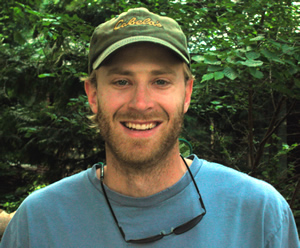
T.J. Fontaine
I was born and raised in Montana and did my undergraduate degree at
the University of Montana. Throughout college and after graduation
I did a number of field jobs that took me all over the U.S. and the world.
One of my greatest experiences was having the opportunity
to work for 10 months in the mountains of Argentina studying avian life
history evolution. I began my graduate career in the fall of 2000 working
with Tom Martin. My research focuses on the role of nest predation in
shaping the evolution of avian life history and parental care. To date
I have conducted five field seasons and I am currently working on finishing
my dissertation with the goal of graduating in May. I hope that working
on the ECOS project and working with young kids and fellow students will
allow me to become a better teacher and a better researcher.
http://www.umt.edu/MCWRU/PERSONNELPROFILE05/PPTJFontaine.asp
Advisor: Tom
Martin Division of Biological Sciences
|
|
Katie Hailer
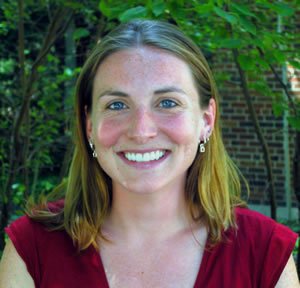
Katie Hailer
I first became interested in ecology growing up on a small cattle farm
in West Virginia . I spent as much time as possible outdoors when I was
younger, and I still love all kinds of outdoor activities now, especially
skiing, boating, and rock climbing. Instead of pursuing a degree in ecology,
I decided to study environmental chemistry. I study chromate, or chromium
VI, which is an occupational component that can cause cancer in humans.
Chromate is used in leather tanning and as a rust inhibitor, to name
a few sources, and if it is not disposed of properly, it can become an
environmental contaminate. My research focuses on studying DNA that has
been exposed to chromate, identifying the damage that occurs, and detecting
enzymes that our bodies have in place to correct the damage. After I
finish my degree, I would like to pursue a teaching position at a small,
liberal arts college. I would personally like to teach college chemistry
in a way that is more relevant, exciting, and down-to earth so that students
can find the "so what" in the topic.
Advisor: Kent
Sugden Department of Chemistry
|
|
Michael Machura
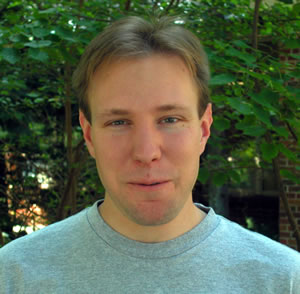
Michael Machura
I am in my second year of a PhD program, and am starting up new research
to examine breeding and movement of boreal toads at different altitudes
and habitats in Glacier National Park. I am originally from Chicago,
but have also lived in upstate New York, Laramie, Wyoming, and the East
African country Tanzania.
While I have been interested in the natural world for as long as I can
remember, it was not until I had the opportunity to live
for two years in Tanzania that I was able to witness first hand the interactions
that occur between humans, plants, animals and the landscape, and truly
develop a passion for ecology. Through my immersion in an African culture,
I developed a unique perspective that not only considered the interactions
of particular organisms, but also the broader picture of
how those interactions play out on a larger landscape in the context
of everyday human activities. In other words, although my research by
necessity tackles precise, manageable questions, I am very interested
in the "big picture." I believe the ECOS
program will help foster an appreciation for our environment
among school-aged children, and will also help build thinking and reasoning
skills through the hands-on activities that are a part of doing science.
In addition to my research, I also have several outside interests including
photography, traveling, and reading. Ultimately, I hope to work internationally
in a position to implement grassroots conservation strategies in developing
nations.
Advisor: Fred
Allendorf/Winsor
Lowe Division of Biological Sciences
|
|
John MacLean
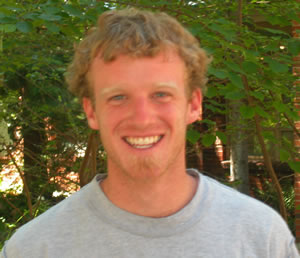
John MacLean
I spent my youth desperately trying to get out of Nashville , TN , and
into the western mountains. I fell in love with the Sierra
Mountains , CA, at a young age, and I returned as often as
I could. When I was completing my BS degree at Furman University
, SC , I realized that a great way to be in the mountains
more was to study earth science. I went on to earn my MS degree in earth
science from Syracuse University, NY, and then I taught earth science
at a high school in Elon, NC. Finally, I made it to the mountains of
western Montana to work on a Ph.D. in earth science. My specific interests
include implementing geochronology techniques to test a Precambrian plate
reconstruction.
So, what does that have to do with ecology? Earth science processes
provide the framework and foundation on which ecosystems are developed.
An understanding of the earth science behind the life science is essential
in a well-rounded ecological study. Hopefully I can contribute some sort
of geological expertise to the ECOS team.
My personal interests include most activities in the mountains. I've
always been an avid hiker, I've picked up mountain and road biking, and
I've begun learning to kayak.
Advisor: James
Sears Department of Geology
|
|
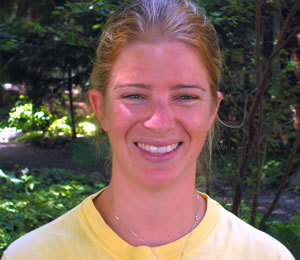
Brooke McBride
Brooke McBride
I have always been fascinated by the natural world. Growing
up in rural Wisconsin , I became keenly aware of the changes
that occurred in the land with each season. Also, I sat
for hours observing
the kittens born in the barn every spring! Throughout high
school and college, I spent my summers leading wilderness
canoeing and backpacking trips for a YMCA camp in northern
Wisconsin . My most epic journey was a 55-day canoe expedition
from northern Saskatchewan to Hudson Bay , where we had
an unexpected encounter with a polar bear! These trips further
deepened my sense of connection to the natural world.
After graduating from college, I moved to Wyoming to participate in
the PREE program (Professional Residency in Environmental Education)
at Teton Science School . There, I led groups of students in hands-on
ecology activities. It was profoundly rewarding for me to integrate my
science knowledge with my outdoor leadership experience. Thus, I am thrilled
for the opportunity to participate as an ECOS fellow. To me, it is the
best of both worlds!
Ultimately, I aspire to teach and continue research at a small college
or non-profit center like Teton Science School . I am especially interested
in teaching field-based courses in ecology and environmental issues.
I am still inspired by a note that a teacher wrote to me: "Thank you
for sharing your love of life with the kids. Keep your heart to the land."
Advisor: Carol Brewer College of Forestry and Conservation
|
|
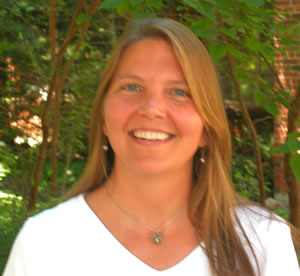
Alison Perkins
Alison Perkins
I didn't realize I was interested in ecology, in fact, I didn't even
really know what it was, until I was in college. I grew up in the city,
doing "city" kinds of things. St. Louis : home of the baseball and football
Cardinals (back then), the Blues (both the music and the hockey team),
the St. Louis Symphony, and the St. Louis Zoo. I spent most of my summers
swimming and waterskiing - I liked being outside - and I chose my college
major, Wildlife Management, for no other reason than it sounded fun.
I was right. I discovered the world outdoors, and I discovered a passion
for ecology that's been growing ever since. I love hiking, birding, and
hunting, plus the sports, music, and museums of the "city." I really
enjoy traveling (local, national, and international), seeing the diversity
this world has to offer. My career interests have evolved from Research
Scientist to Television Producer. I still love wildlife research, especially
ducks; I just would prefer to share the really cool things about ecological
research through television programs. I hope ECOS will help me learn
to communicate with all ages and all learners more effectively, and I
hope to learn to teach for life-long learning.
Advisor: Carol
Brewer College of Forestry and Conservation
|
|
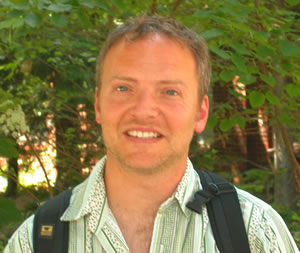
Sam Stier
Sam Stier
I think my interest in ecology began in the summer after I moved to
Iowa from Washington D.C. , when I was 9 years old. And it
came first in the form of frogs. There were several ponds near my house
and I spent every day exploring them, practically on hands and knees.
I don't think I had ever seen a frog before, or if I had, it was in a
zoo and not in a natural setting and had minimal impact. But to crawl
around trying to catch frogs in a pond-studded Iowa landscape sure had
an impact! I was hooked.
I have done a lot of ecologically related work in the last 10 years,
for example, a masters in science that involved scientific research
on endangered flying foxes in the Philippine Islands, and consulting
work with the World Bank and international non-profit organizations.
I continue to be interested in a diverse career that might involve
more consulting, running my own organization, and perhaps teaching
and more research.
I think ECOS is a great idea for a program. Graduate students and
local K-12 schools have a lot to give one another. Personally, I'm
particularly interested in meeting the students and teachers I'll
be working with.
My other interests include my 7 month old son (he's so much fun!),
learning about the wildlife in my own backyard, playing guitar, eating
great things out of my garden, talking with my wife, hiking, rafting,
biking, skiing, seeing my family and friends, and meeting new people.
Advisor: Stephen
F. Siebert College of Forestry
and Conservation
|
|
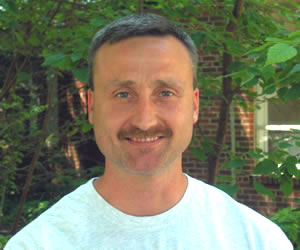
Bruce Threlkeld
Bruce Threlkeld
I've been interested in ecology since childhood, but my appreciation
for nature really blossomed as a college student working summers at a
wilderness camp in the southern Appalachian mountains . I was intrigued
by plant and animal life in forests and after a number of years working
as a wilderness programs director at the camp I decided to move to Montana
to study in an academically rigorous setting. I received my Masters degree
in environmental studies from the University of Montana in 2000. After
completing my Ph.D., I plan on pursuing a career as an ecology or environmental
studies professor at a college or university.
ECOS provides an excellent opportunity to develop skills for effective
ecology teaching. Working with like-minded peers and colleagues
in a team setting is a great way to learn important curriculum
concepts and receive constructive feedback, benefiting both teacher
and student.
In addition to my academic pursuits, I enjoy spending time with
my wife and daughters, playing soccer, and teaching and playing
drums and guitar. I was born in Kentucky , spent many years
in Texas, Florida, and Georgia, and lived in North Carolina
before moving to Montana in 1997.
Advisor: Stephen
F. Siebert College of Forestry and Conservation
|
|
At-Large PhD Fellows
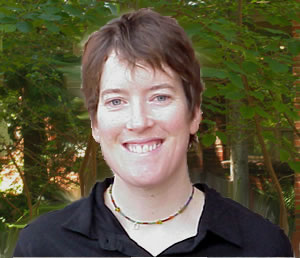
Rachel Loehman
Rachel Loehman
I came to Missoula in 2000 to study with Dr. Steven Running in the Numerical
Terradynamic Simulation Group (NTSG), College of Forestry and Conservation.
NTSG is a remote sensing and ecological modeling lab that focuses on
pioneering new approaches for addressing regional and global ecological
problems using emerging satellite technologies, geographic information
systems (GIS), computer simulation and visualization, and biophysical
theory. My own research is on developing ways to predict vector-borne
diseases using remotely sensed data and climate modeling. My current
focus is on developing a forecast model for hantavirus pulmonary syndrome
(HPS), based on modeled distributions of the disease reservoir and vector,
the deer mouse. I participated in the ECOS Program during the 2004-2005
academic year, working with 5 th grade students and teachers at Target
Range school. During the coming year I hope to improve on the teaching
skills and inquiries I developed last year, and innovate new projects
that will help sustain the ECOS Program at the University of Montana
and enhance ecological learning at all grade levels within the public
school system.
I grew up in New Mexico , and have a B.A. in Archaeology and
an M.A. in Biogeography from the University of New Mexico in
Albuquerque . I spent a number of years working as an archaeologist
across the southwestern US, and became interested in using GIS
and modeling to predict archaeological site distributions. While
working toward my M.A. I began to use GIS and remote sensing
technologies to address ecological problems, specifically temporal
variability and spatial patterning in biotic and abiotic resources
at regional scales. For my Master's thesis I developed a large-scale
predictive model for HPS based on distribution of human cases
in the Four Corners region of the southwest. Here at the University
of Montana I am working to improve this model, using a more
sophisticated remote sensing data set and incorporating vector
(deer mouse) population dynamics. My research is interesting
to me because it is very interdisciplinary, and integrates a
number of fascinating areas of research: wildlife biology, landscape
ecology, epidemiology, climatology, remote sensing and GIS,
public policy, public health, and education.
My interests outside of academia include backpacking, skiing,
hiking, kayaking, canoeing, bicycling, and exploring. I build
single-speed bicycles from old road bikes as a stress-relieving
hobby. I also love to read and garden, and have ever-expanding
collections of field guides, rocks, plants, textiles from foreign
lands, skulls and bones, shells, Star Wars Pez dispensers, and
dogs. My most recent and unusual pet is a European Black Slug,
which I found at the Flathead Lake BioStation this summer. I
love the outdoors, and believe strongly in the importance of
conservation of natural resources and wild places. I hope to
use my training and skills to work toward better stewardship
and increased awareness of global ecosystems. My ideal job combines
research, teaching, and conservation work in a context that
allows for continued understanding of the natural world, and
the mechanisms to disseminate that knowledge to many different
sorts of people.
Advisor: Steve
Running College of Forestry and Conservation
|
|
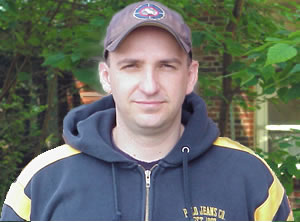
Carl Rosier
Carl Rosier
From an early age I knew that I wanted to study science. As a child
I would often take long hikes through the swamps that bordered my granddads
farm. Many times during those adventures I would find some creature that
intrigued, and I would bring it home study it for awhile then release
it. I was first exposed to the science of ecology during my 8 th grade
year. It was at this time that several middle schools competed in the
ECO challenge: which was a competition designed by the Florida Natural
Parks System to test students' knowledge of natural history and ecology.
I was accepted to the ECO team that represented my school. Following
the competition my science teacher told me I had a real knack for science
and that I should actively pursue this subject in high school as well
as college.
I received my undergraduate degree in plant science from
the University of California Santa Cruz. I first became interested
in plants while taking and introductory class in Botany/Plant
Pathology. After spending many hours discussing plants with
the course professor he offered me a job. I found Plant Pathology
incredibly interesting so much so that when I graduated from
UCSC I began to apply to plant pathology graduate programs.
Eventually I was accepted into a graduate program
After graduating from UCSC and before entering graduate
school I moved to Missoula in search of adventure. Eventually
I accepted a position with Bitterroot Restoration Inc, as
a consultant. I felt that the work I was doing had real importance
so I delayed my entrance into graduate school. As a land
restoration consultant I saw how pollution is severely influencing
ecosystems. At a conference on land restoration I first learned
about phytoremediation (use of plants to remove pollutants
from contaminated areas). I became so intrigued with the
idea of using plants to cleanup the environment, that I quit
my job and applied to graduate school. Currently I am studying
in the lab of Dr. Rillig, the focus of my study is determining
how Arbuscular Mycorrhizal fungi influence the phytoremediation
of radionuclides.
Advisor: Matthias
Rillig Division of Biological
Sciences
|
|
Special Projects PhD Fellow
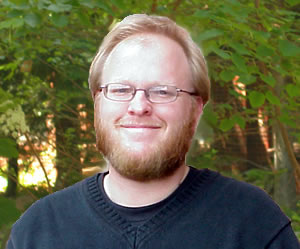
Jeff Piotrowski
Jeff Piotrowski
I was raised in the Salt Marshes of coastal Georgia and from an early
age had a strong interest in the natural world, in particular plants
and fungi. Southeastern salt marshes are among the most productive systems
on earth. At age 13 I would peddle my bike to across the island at midnight
to look for sea turtles or the rare Green fly orchid. It was this environment
gave me an appreciation for the natural world.
I received my undergraduate degree from the University of
Georgia in Botany. UGA was home to the late Eugene Odum,
a pioneer of ecological research, who gave several lectures
to my introductory Ecology class. He always stressed the
importance of teaching more comprehensive ecology to students
at the pre-college levels. I worked in the fungal ecology
lab of Dr. David Porter on the decomposer communities of
the salt marsh. David Porter was a great mentor who encouraged
me to follow my interests no matter how obscure. During my
time in there I spent most weekends in the southern Appalachian
Mountains , an environment with some of the greatest deciduous
tree diversity and the greatest amphibian diversity.
Upon graduation from Georgia I took a position at the University
of Maine with Dr. Joyce Longcore studying a fungal pathogen
of amphibians responsible of several extinctions. I studied
the environmental conditions of the fungus to help amphibian
biologists predict and model outbreaks and I studied the
enzyme production of the fungus to learn how it kills its
host. Maine is a pristine state that is 20% wetlands, which
I explored with all my free time.
After receiving my Master's in Botany/ Plant Pathology from
Maine I worked at the University of Georgia 's Herbarium
where I gained a greater appreciation for plant diversity.
Before taking my current position at the University of Montana
I traveled through Europe working on organic farms with my
fiancé and learning the importance of sustainable
agriculture. I am currently working in the lab of Dr. Matthias
Rillig where I am studying the ecology of arbuscular mycorrhizal
communities for my PhD.
Advisor: Matthias
Rillig Division of Biological Sciences
|
|


 Funded by the National Science Foundation
Funded by the National Science Foundation